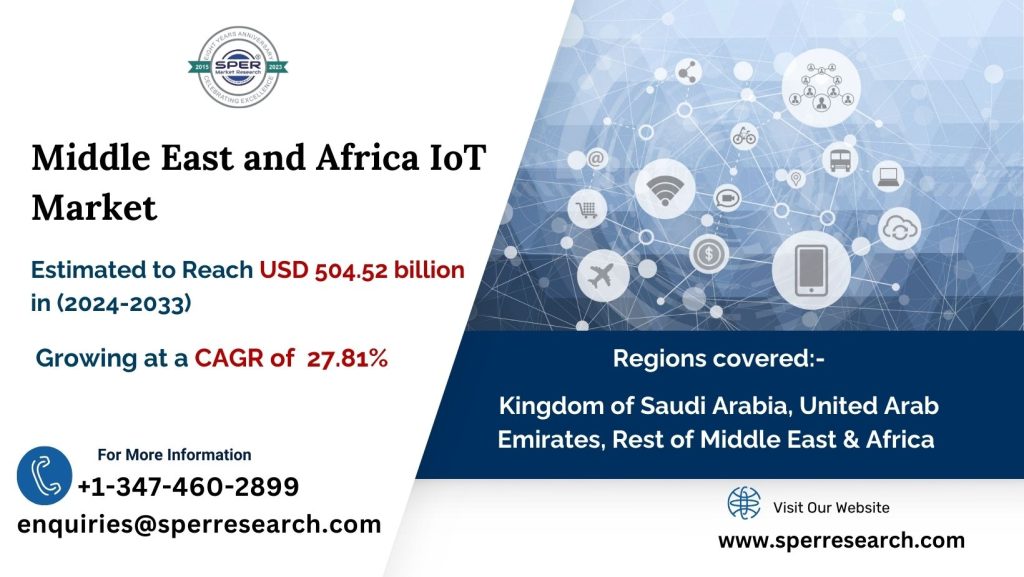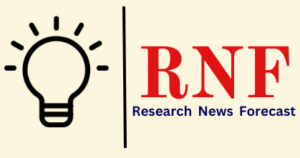MEA Internet of Things (IoT) Market Share, Revenue, Scope, Growth Drivers, Trends Analysis, Key Players, Challenges and Future Opportunities 2024-2033: SPER Market Research

The networking of physical objects with electronics integrated into their architecture to sense and communicate with one another and the outside world is known as the Internet of Things (IoT). IoT-based technology will provide higher quality services and essentially transform how people live their daily lives in the coming years. IoT is widely established in a number of categories, including gene therapies, smart homes, smart cities, smart power, and medical advancements. The Internet of Things (IOT) is a network of connected objects, including computers, digital and mechanical machinery, items, animals, and people with unique identifiers. and the capacity to send the data over a network that calls for communication between people or between people and computers.
According to SPER Market Research, ‘Middle East and Africa IoT Market Size- By Component, By End Use Industry- Regional Outlook, Competitive Strategies and Segment Forecast to 2033’ states that the Middle East and Africa IoT Market is estimated to reach USD 504.52 billion by 2033 with a CAGR of 27.81%.
Technological developments in sensors, connectivity, and data analytics in particular are driving the Internet of Things market and making cost-effective and efficient solutions possible for a wide range of industries. Adoption is fuelled by the growing demand for seamless connectivity and the expansion of smart devices such as wearables and smart appliances. IoT deployment is further boosted by Industry 4.0 and digital transformation initiatives, which improve decision-making and operational efficiency. The COVID-19 pandemic is driving up the adoption of IoT for remote operations by increasing the need for remote monitoring. Government initiatives and regulations encourage the adoption of IoT in industries like smart cities and healthcare, while data-driven insights from IoT devices optimize processes and inform strategies. The adoption of IoT solutions by businesses is primarily motivated by cost reduction and operational efficiency, which aim to enhance their competitiveness and performance.
Request For Free Sample Report @ https://www.sperresearch.com/report-store/middle-east-and-africa-iot-market.aspx?sample=1
Interoperability problems between various platforms and devices pose a challenge to the IoT market, making it more difficult to integrate and exchange data seamlessly. As IoT ecosystems grow, security and privacy concerns remain, necessitating strong measures to protect sensitive data and stop cyber threats. Large-scale deployments face challenges related to scalability and complexity, which calls for the use of standardized frameworks and streamlined management techniques. IoT implementation is hampered by limited bandwidth and connectivity in some areas, and small businesses are discouraged by high initial investment costs. IoT deployment and operation are further complicated by regional variations in legal and regulatory compliance.
The IoT market has been significantly impacted by the COVID-19 pandemic. On the one hand, it hastened the adoption of IoT solutions to deal with the problems brought on by the crisis, especially in supply chain management, remote monitoring, and healthcare. The need for remote patient monitoring, remote operations to ensure business continuity, and supply chain resilience optimization drove this spike in demand for IoT technologies. On the other hand, the pandemic also caused delays in the production and deployment of hardware by upsetting global supply chains. Budgetary restrictions brought about by economic uncertainty affected investments in IoT projects, particularly in industries that were severely impacted by the pandemic.
Middle East and Africa IoT Market Key Players:
U.A.E. dominates the Middle East and Africa IoT Node and Gateway Market because of its rapid development in various sectors, including technology and infrastructure. ACACIA (UAE), Avnet (US), EPm AI Empowered Solutions (UAE), IOTPlus (UAE), iSAT Africa (Africa), iWire Global (UAE), Scope Middle East (UAE), Telit (US), Trinity (South Africa), Others are the key players of the market.
Middle East and Africa IoT Market Segmentation:
By Component: Based on the component, Middle East and Africa IoT Market is segmented as; Platform, Solution & Services.
By End-use Industry: Based on the end-use industry, Middle East and Africa IoT Market is segmented as; BFSI, Retail, Government, Healthcare, Manufacturing, Agriculture, Sustainable Energy, Transportation, IT & Telecom.
By Region: This research also includes data for Kingdom of Saudi Arabia, United Arab Emirates, Rest of Middle East & Africa.
This study also encompasses various drivers and restraining factors of this market for the forecast period. Various growth opportunities are also discussed in the report.
For More Information, refer to below link:-
Middle East and Africa IoT Market Future Outlook
Related Reports:
Follow Us –
LinkedIn | Instagram | Facebook | Twitter
Contact Us:
Sara Lopes, Business Consultant – U.S.A.
SPER Market Research
+1-347-460-2899





